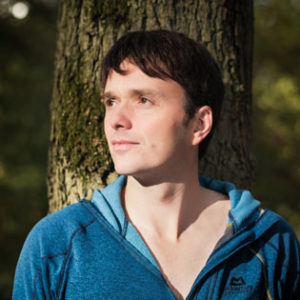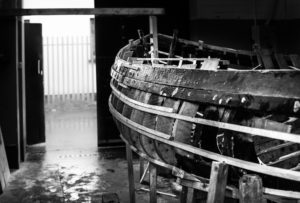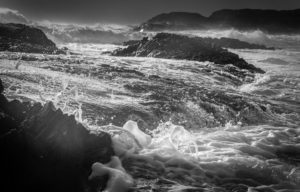 1. What is your role within the History department? I’m a Senior Lecturer in Modern History, who most second years will know from History in Theory & Practice.
1. What is your role within the History department? I’m a Senior Lecturer in Modern History, who most second years will know from History in Theory & Practice.
2. What are your research interests? I study Atlantic coastlines and the communities that live on them, the histories of oceans and sealife. I try to do my research from on or in the sea – in small boats, such as my kayak and traditional wooden and canvas craft.  Because coastlines are often connected to each other more than they’re connected to the nations they’re supposedly part of, they give us unique geographical perspectives and help us see the problems with lots of national historical narratives.
Because coastlines are often connected to each other more than they’re connected to the nations they’re supposedly part of, they give us unique geographical perspectives and help us see the problems with lots of national historical narratives.
3. Where did you study (UG, PGT, PGR etc.)? I spent a long time at Cambridge before coming to Birmingham: ten long years.
4. Did you always know you wanted to go to university or in to academia?I’m still the only person in my family, including all my cousins etc, to have done a university degree. I come from a family that includes lots of musicians, and I intended to go to music college but instead decided to do a music degree at university. I’m extremely glad I made that choice, because I wouldn’t have been able to do all the things I enjoy doing today without university. I changed to history during that degree (I tried to do so in the third week, but wasn’t allowed to until later because Cambridge has a system where the first two years count as ‘Part 1’ and the last year ‘Part 2’).
5. How long did it take and how did you manage to fund and complete your PhD? My PhD was done in 3 years, thanks mainly to a really amazing supervisor and because I managed to get AHRC funding which meant I didn’t have to work alongside it. I also chose not to do any teaching until after getting the PhD (which is a choice I probably wouldn’t make in today’s world). They were three wonderful years of freedom to read really widely and think about things at my own pace.
6. What was your PhD on? My PhD was about the religious ideas that shaped the emergence of archaeological and philological disciplines such as Egyptology and Assyriology; it was a cultural history of the people who began those disciplines and the world in which they lived. It involved travel to Egypt, and became a book called Dialogues with the Dead before I decided to leave that field behind.
7. What are you working on at the moment?

At the moment I’m working on two books but – like most people – not proving very productive in these lockdown conditions. One book is quite theoretical (very HTPish) and is called Being Littoral: Rethinking Atlantic Britain and Ireland. The title of the other is Afloat: Small Boats at Sea in the North Atlantic World and involves journeys in little boats in Faroe, Greenland and Newfoundland among other places. I’m reading lots and lots about Canadian First Nations and their boats, and lots of theory about water, such as Astrida Neimanis’ hydrofeminism. The project began in Ireland just before lockdown, hanging around in workshops with boat builders…
…and going on some terrifying Atlantic journeys, here’s a picture from the boat:

8. What made you want to become a lecturer/academic? There were three things I loved when I was younger: music, writing and nature. I almost dropped out of my music degree to do a land management course in the Peak District National Park (I grew up in Glossop, near Manchester, on the edge of the Peak District). But the desire to write was always really strong, and one really, really nice thing about academia is that you can use it to combine all your interests whatever they might be.
9. Name three books/films/podcasts you recommend to read/watch/listen to during lockdown. For some powerful intellectual stimulation, go for Ariella Azoulay’s wonderful new Potential History. If, like me, you’re missing being out on coastlines, go for a little book of new poetry, Roseanne Watt’s Moder Dy. And why not listen to The Boring Talks? (I particularly like the one about collecting cornflakes).
10. What is the most historically inaccurate film or scene you have watched or read? Definitely The Rise of Skywalker (sorry – I’m not going to answer this one properly, just because I really enjoy historical inaccuracy and don’t like holding film or tv to account for it!).
11. Are you staying physically active during lockdown? If so, how, and do you suggest anything? I’m running around a lot. I’m also quietly heading out onto a river in my kayak every so often, in the hope that I can still be in shape to take boats out to sea as soon as lockdown ends. I’ve been amazed at how irrelevant my gym membership now seems: running, kayaking and doing pull ups in the garden feels much healthier than what I did before lockdown.
12. Do you have any pets? If so, what? (Pictures encouraged!)

I love animals, and part of the reason I research what I do is for the otters, dolphins and seabirds that come and investigate people in little boats.

When I moved to Birmingham I chose a house near a nature reserve and next to railway lines that lots of animals use to move about the area, and I dug a pond in the garden. So this year I have ducklings, and there’s a fox, badgers and deer that visit. I don’t have any actual pets though, and I’m always scared that my garden wildlife will be destroyed if neighbours get a cat.
13. What is your favourite film or TV series? I loved Sex Education. Gillian Anderson was amazing in it, and Eric was one of the best characters ever.
14. Do you have a favourite band/album/genre of music? If so, what? My musical tastes are strange. Lots of 16th, 19th and 20th century classical music, or things from distinctive hybrid record labels like ECM, dark electronic things like Rawtekk or equally dark folk things like Rachel Newton (whose song The Fairy Man is my alarm in the morning) or the Unthanks. Modern folk like Lau (The Bell that Never Rang is one of my favourite albums ever) and The Gloaming (their first two albums are also at the top of my list). 1950s things like Clifford Brown and early Sonny Rollins (my ringtone is his song St Thomas). Traditional Bengali music (I have a lot of Indian family). Norwegian and Finnish music like Arve Henriksen or Sinikka Langeland. Songwriters like Laura Marling, Little Simz, These New Puritans and Spellling, or weirder songwriters like Richard Dawson, Chelsea Wolfe and the very, very great Melt Banana. Or heavier things like Vallenfyre and Bloodbath. Anything that feels distinctive enough to drag me into a different mood.
15. Do you have any unusual links or claims to fame? Hmmm – I guess going to Uni with Eddie Redmayne was the closest I’ve been to a famous person. And one unusual link for a historian is that I’ve played on albums by singer songwriters and Nordic-folk and jazz musicians (I was in a band with the person who now writes the music for TV shows like Black Mirror, this was us).
16. What skill would you one day like to master? I’ve been trying to learn languages like Welsh and Scottish Gaelic for a long time, but am really, really bad at them. I’d love to be able to develop a talent for learning languages: that would make my life much, much easier.
17. What takes up too much of your time? Editing my very bad writing. My first drafts always end up in the bin, as do my second, third and fourth drafts. I also love cooking and am very easily distracted by recipes for huge and elaborate feasts.
18. What songs have you completely memorized? Loads! I spent a short amount of time working in Japan, where me and the people I worked with once went to do karaoke four times in a single day. Deep in my memory there are Japanese classics such as Sakura, along with lots of Taylor Swift, Girls Aloud, Carly Rae Jepsen and several random 2015 chart hits. From travelling on the west coasts of Scotland, Ireland and Wales I also have quite a few traditional folk things memorised, like the beautiful Welsh song ‘Dod dy law’.
19. What advice would you give to your younger self? The biggest part of my teaching at Birmingham is History in Theory and Practice, and teaching that module is one of my absolute favourite things. I love the power of theoretical scholarship to make you see everything about the world differently. You don’t have to agree with the worldviews theorists set up, and in fact it’s often the ones you agree with least who provide the most powerful thought experiments. In my view, a theorist like Foucault provides an extraordinary set of lenses on past and present, and to criticise his work for getting historical details wrong (which he constantly did) is a bit like criticising a novelist for not making enough jam, or a footballer for not scoring enough tries. My ideal kind of history has perspectives from theory underlying it all the time, but isn’t written as theory – is written to try and engage different audiences with the perspectives theory establishes.
However, when I was a student, I thought all theory was really ridiculous and completely refused to engage with it. It took me at least ten years from being introduced to theory to actually realise both the enormous potential it has to make us think differently and how much I actually loved it. I’d go back to my 21-year-old self and show him what he could gain by engaging with theory!
20. Do you have any top tips for academic work/study for our students? My answers to this relate back to 19 and 17. Try and get as many different perspectives on the things you’re writing about as possible. Explore this website for some ideas: https://globalsocialtheory.org/ But also think lots about your writing style. I’m a firm believer in the idea that almost no one writes well, and that those who seem to write well are just the ones who spend more time editing than actually writing. Good editing – to help you say complex things in simple, clear ways – is an extremely important skill to practice. And you can even just practice it on your old essays at any time.
